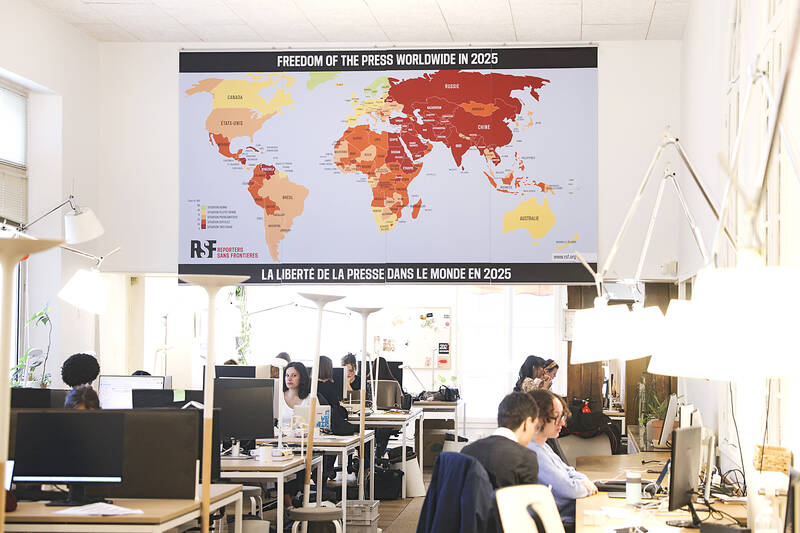Taiwan ranked 24th in this year’s World Press Freedom Index released by Reporters Without Borders (RSF) yesterday, climbing three places from last year, while press freedom declined in most other countries.
Taiwan was second in the Asia-Pacific region and first in East Asia.
Aleksandra Bielakowska, advocacy manager at RSF’s Asia-Pacific Bureau, said that Taiwan’s improvement was largely due to declines elsewhere, as the country’s global score, which was 77.04 this year, was nearly unchanged from a year earlier.
Photo: EPA-EFE
It was “quite significant” how public trust in the media had grown in Taiwan over the past five years, she said, citing the Reuters Institute’s Digital News Report, which showed the metric at 33 percent last year, up from 24 percent in 2020.
However, “government pressure” led English-language public broadcaster TaiwanPlus to remove a report referring to then-US presidential candidate Donald Trump as a “convicted felon” in November last year, Bielakowska said, adding that it was a “rare,” but “deplorable and very worrying” incident.
Public media have a mandate to serve the public and must be able to operate independently from the government, she said.
Public Television Service (PTS), to which TaiwanPlus is affiliated, at the time cited concerns over the TaiwanPlus report’s “objectivity” as the main reason for its removal.
Minister of Culture Li Yuan (李遠) later said that the controversy caused by the report was “very serious” and that his ministry had “informed” PTS of that.
Bielakowska also expressed concern over press freedom in Hong Kong, which dropped to 140th from 135th in the rankings, recording its lowest-ever global score of 39.86 this year.
“Basically, we see that it’s starting to be almost impossible [for Hong Kong journalists] to continue working” in an environment where they face ongoing government pressure and, in some cases, sedition charges for their reporting, she said.
The latest rankings showed that press freedom worldwide deteriorated over the past year to the “difficult” category — the second-lowest in the index’s five-tier system — for the first time since it was launched in 2002.
“More than six out of 10 countries, or 112 in total, saw their overall scores decline in the index,” the group said, attributing the deterioration to economic pressure media firms faced.
The situation largely stemmed from ownership concentration, pressure from advertisers and financial backers, and limited or nontransparent public funding, RSF said.
Norway topped the rankings again this year, followed by Estonia and the Netherlands, according to the index, which is based on surveys of journalists, researchers and human rights advocates worldwide.
At the other end of the list were China (178th), North Korea (179th) and Eritrea (180th and last).
MORE VISITORS: The Tourism Administration said that it is seeing positive prospects in its efforts to expand the tourism market in North America and Europe Taiwan has been ranked as the cheapest place in the world to travel to this year, based on a list recommended by NerdWallet. The San Francisco-based personal finance company said that Taiwan topped the list of 16 nations it chose for budget travelers because US tourists do not need visas and travelers can easily have a good meal for less than US$10. A bus ride in Taipei costs just under US$0.50, while subway rides start at US$0.60, the firm said, adding that public transportation in Taiwan is easy to navigate. The firm also called Taiwan a “food lover’s paradise,” citing inexpensive breakfast stalls
PLUGGING HOLES: The amendments would bring the legislation in line with systems found in other countries such as Japan and the US, Legislator Chen Kuan-ting said Democratic Progressive Party (DPP) Legislator Chen Kuan-ting (陳冠廷) has proposed amending national security legislation amid a spate of espionage cases. Potential gaps in security vetting procedures for personnel with access to sensitive information prompted him to propose the amendments, which would introduce changes to Article 14 of the Classified National Security Information Protection Act (國家機密保護法), Chen said yesterday. The proposal, which aims to enhance interagency vetting procedures and reduce the risk of classified information leaks, would establish a comprehensive security clearance system in Taiwan, he said. The amendment would require character and loyalty checks for civil servants and intelligence personnel prior to
US PUBLICATION: The results indicated a change in attitude after a 2023 survey showed 55 percent supported full-scale war to achieve unification, the report said More than half of Chinese were against the use of force to unify with Taiwan under any circumstances, a survey conducted by the Atlanta, Georgia-based Carter Center and Emory University found. The survey results, which were released on Wednesday in a report titled “Sovereignty, Security, & US-China Relations: Chinese Public Opinion,” showed that 55.1 percent of respondents agreed or somewhat agreed that “the Taiwan problem should not be resolved using force under any circumstances,” while 24.5 percent “strongly” or “somewhat” disagreed with the statement. The results indicated a change in attitude after a survey published in “Assessing Public Support for (Non)Peaceful Unification
The China Coast Guard has seized control of a disputed reef near a major Philippine military outpost in the South China Sea, Beijing’s state media said, adding to longstanding territorial tensions with Manila. Beijing claims sovereignty over almost all of the South China Sea and has waved away competing assertions from other countries as well as an international ruling that its position has no legal basis. China and the Philippines have engaged in months of confrontations in the contested waters, and Manila is taking part in sweeping joint military drills with the US which Beijing has slammed as destabilizing. The Chinese coast guard
Taiwan rises to 24th in World Press Freedom Index – Taipei Times
